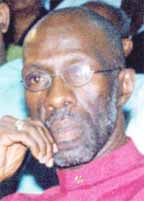Local government expert Vincent Alexander says independent councillors and a functioning Local Government Commission will be crucial for establishing accountability and autonomy in the local government bodies that will be elected at the impending polls.
In an interview with Stabroek News yesterday, Alexander, who is a member of the Guyana Elections Commission, noted that any council made up of only one political party will see councillors more loyal to the party than the citizenry.
“The real politic is that councillor (under the proportional representation system) feels an obligation to the party because the party extracted him from the list, so it undermines the real autonomy of the council,” Alexander said. He added that the local government reforms, which allow for 50% of a council’s seats to be won directly through a first-past-the-post system, is essential to the creation of a more responsive council.

“The extent to which we have councillors that are independent and even those who are not independent but are individual councillors allows for them to rationalise, in their heads, where their accountability lies. They will have to be thinking about how they got there; they did not get there purely because of the party but because of citizens. So, that can help to create a new relationship, at least between some of the councillors and the citizens,” he explained.
He added that since all first-past-the-post candidates are now identifiable to their constituents, they will now have to be responsive as their political career depends on what they are able to deliver.
“They can’t go back asking for votes at another elections if they didn’t perform. So, the level of accountability has increased,” he said.
Alexander is also counting on the proportional representation system to produce a healthy mix of representatives.
“The other 50% of the seats will also include not just political parties but civil society groups. I am looking to see what the new dynamic will be. Its heterogeneous nature and individual accountability is likely to lead to a certain level of autonomy,” he stressed.
Local government polls will be run off on Friday, after being delayed for over two decades.
Meanwhile, speaking on the Local Government Commission, Alexander said once it is constituted, it will free the local government authorities from the interference of the central government and reduce conflict between them.
He explained that much of the contention between the local authority and the government has traditionally stemmed from the power of the minister in relation to local authority staffing.
This was illustrated by the constant disagreement between the Georgetown Mayor and City Council and Town Clerk Carol Sooba. For three years, Sooba and the council engaged in a highly publicised power struggle. With the support of then Minister of Local government Norman Whittaker, Sooba refused to implement council decisions, locked the council out of the council chambers, cut the stipend of councillors and directed city officers not to report to the council’s fortnightly statutory meetings.
Alexander explained that a minister who has the power to appoint a local government officer is likely to appoint an officer sympathetic to central government.
“Employees, aware that the minister can step in and fire, tend to look to the minister and follow his directive rather than those of the mayor and council,” he explained.
He noted that the problems at the Georgetown council were due as to consistent attempts by that authority and central government to one up each other in a power struggle.
“Problems arose due to the council, in the person of Mayor, overstepping and the bureaucrat seeking protection from the minister and then being caught up with government’s agenda and overstepping their role. So it becomes a power struggle with constant conflict rather cooperation,” he said.
According to Alexander, this type of power struggle should not exist in the new system as the authority which presently rests in the minister will be vested in the Commission, which is expected to be “non-partisan.”
“It means that once that Commission is established, then the ministry will no longer have a role to play in hiring staff. Hiring will now be done in a less political and more bureaucratic manner,” he said, before adding that problems of discipline on the part of staff will be dealt with at the level of the Commission.
The Local Government Commission is to be comprised of eight members; three to be appointed by the president, three by the president after conferring with the leader of the opposition, one nominated from the trade unions in the area of local government; and one nominated by the Communities Minister, after consultation with local government organs.





